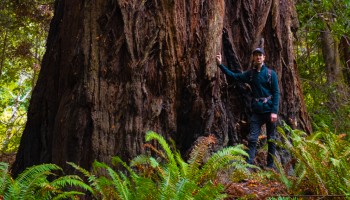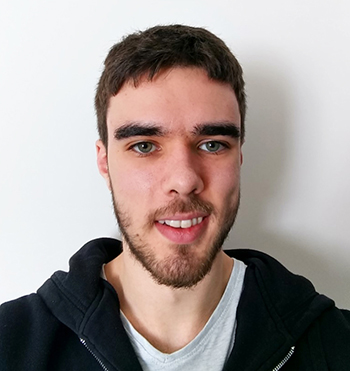Students experiences of PIPS are largely positive, the placement presents an opportunity to explore and develop new skills in a business environment.
Find out what our students and host organisations have to say about the Professional Internships.
Redwood National and State Parks - California, USA“I have always been a huge supporter of the educational process. One of the core principles of the National Park Service mission is to preserve these lands to allow for 'the enjoyment, education, and inspiration of this and future generations.' I feel we helped to meet that mission at Redwood National and State Parks by partnering with the University of Cambridge and bringing on one of their students to work alongside park staff in meeting the NPS mission and the resource management objectives. It was a wonderful expression of mentorship and learning while celebrating cultural diversity.” Jason Teraoka, Forester, Redwood National and State Parks
|
"I really wanted to learn more about an area of science and industry that interested me, but which lies outside of my PhD research area. As such, I chose to spend my PIPS working with the forestry team at Redwood National and State Parks in California. It was a surreal and amazing experience where I learnt so much about forest biology and the restoration process. I worked alongside two other interns, the two forestry technicians, and the lead forester; I helped with day-to-day data collection and analysis, alongside learning about the management and decision making processes that are made in a large-scale restoration project. My advice would be to think about what interests you both academically and at a personal level; find a PIPS project that will help you explore those interests and expand your opportunities post-PhD." William Boxall, DTP Student, |
|
Sam was a fantastic addition to our team at Nutopia and contributed a huge amount during his placement with us. He helped us on a television series for a major US network and had a very strong editorial approach of how complex science could be translated for a general audience. He worked very closely with many members of the team to find and research stories, he also assisted in setting up shoots across the world. He was a brilliant team member and we were sad to see him go after his 3 months! Patricia Ward
|
Please accept marketing cookies to show embedded content (open cookie preferences)View content (opens www.youtube.com in a new tab)
"Try and realize that the PIPS is not a tick box exercise to complete or a barrier between you being in the lab and getting on with your research. It's an opportunity to get involved with a project or organisation in a capacity that you would never be able to under normal circumstances. There is no way that I would be able to apply to Nutopia as a random person off the street with no TV experience things for them. Being at Cambridge and having this funded opportunity through the BBSRC DTP PIPS scheme allows these organizations to take a risk on you as they don't need to worry about the legalities of unpaid interns or covering your expenses as it's all handled by the BBSRC DTP." Dr Sam Reynolds, Post-Doctoral Research Associate, |
|
“It was fantastic to host Andrew over the summer, and he fitted in seamlessly with the rest of the headquarters team. He worked incredibly hard and put together a significant amount of content for World Alzheimer’s Month, which we often struggle to give the attention it deserves. It was great to see the confidence he showed when interacting with the researchers, especially in the form of video interviews. I’ve only had positive experiences with the PIPS programme and I’d definitely recommend it to other organisations.” Alex Collcutt Ph.D, Research Communications Manager, UK Dementia Research Institute HQ
|
"Managing multiple tasks in parallel helped me to develop my organisational and time management skills, to ensure that all of the articles were progressing, especially when I needed information from different researchers. The PIPS was a very useful experience for me, as it confirmed to me that a role in science communication was something that I wanted to pursue in the future. My main advice for other students deciding on their PIPS is to identify what science role outside of academia they want to learn more about, so that the experience can be most useful for their future career decisions." Andrew Smith, DTP Student, |
|
"Kishen helped us landscape and implement a new client relationship management (CRM) system which is essential for our function and continued growth. We have an existing system that isn’t fit for purpose and he first assessed our needs through internal stakeholder interviews. Next, he interviewed third parties in our field to understand best practice. Finally, Kishen thoroughly assessed several leading CRM software platforms and arranged demos for our management team to finalise and select a platform. Kishen also shadowed our management team, attending due diligence meetings with potential portfolio companies and supporting certain companies in our portfolio. He went above and beyond his remit and has left an impressive legacy." Jason Mellod, CEO, Start Codon Limited |
Please accept marketing cookies to show embedded content (open cookie preferences)View content (opens www.youtube.com in a new tab) "My PIPS was done with Cambridge-based Life Sciences Venture Builder Start Codon. It was really fascinating to see science through more of the business angle. I was mainly responsible for the research, implementation and testing of key productivity tools that could help in the automation and streamlining of a due diligence pipeline, as well as hopefully ensuring the long term sustainability of Start Codon as the company grows. It was great to be involved in the more day to day operations, such as be able to sit in on the pitches. This was a great event where some of the best companies on the Start Codon portfolio were able to present and pitch to a room full of investors in the hope of receiving that next round of Series A funding." Kishen Chahwala, DTP Student, |
Some aims of this internship were to improve my understanding of scientific publishing, to improve the way I present my research to people outside of my area of research and to gain insight into problems identified by editors in the publication process.
By looking at article submissions each morning with the managing editor, I learned how to clearly present my research to interest editorial staff who may not work in my field of research. This also helped me to understand which common avoidable flaws appear in submissions, how best to communicate with editors about articles under revision and how reviewers are likely to see my research. This is likely to be immediately useful with a view towards publishing my own research, but also useful in the long term to understand the publishing process.
Summarising research articles for brief pieces in the magazine has helped me develop my skills in quickly assessing which information is most relevant to concisely convey the results of research. In the past, I have often found it difficult to determine how much detail is required to explain my research to people unfamiliar with the topic, but reading a broad range of research articles and writing concise summaries has given me a better understanding of how to approach this.
Overall this internship has helped me to develop skills in critical assessment of research, identification of relevant information, analysis of external data and providing information for educational purposes. It has also given me valuable insight into scientific publishing that will be helpful for my future career, whether I remain in academia or pursue publishing.
I wanted to improve my capacity to work in a team, and I must say, this was a wonderful occasion. Indeed, while testing the colony picker, I encountered a number of issues that I could not have solved by myself. I really saw how complex problems and projects could only be handled by a group of people interacting with each other and sharing their ideas to progress as efficiently as possible. I really believe that experience improved my team working and my capacity both to help other and seek their help as soon as I need it.
Conducting meetings where the whole team can throw suggestion and remark to highlight the strong and weak point of a proposal was also very formative.
It also gave me the opportunity to communicate more on the work I was conducting, improving my communication skills
I was also involved in all the steps of product development, from the early market research to the product launching and final testing. Knowing how all these steps are conducted will prove hopeful in other domain as the process is not dependent on the product. I am very glad I could be part of it and improve my skills in product development management.
I was able to get an unparalleled overview of the space industry and the state of the art of life support systems including bioregenerative systems. During the course of the PIPS, I experienced what it was like to be in a high intensity working groups of different sizes that need to self-organize and meet tight deadlines.
I learnt the necessity of clear diplomatic communication when working with many nationalities with varying levels of language ability and sometimes very different cultural and ethical values.
Overall I understand my PIPS was unconventional compared to others, however, it achieved the same goals in providing an even broader industry insight than working for one company, and in all I can say it was a life-changing experience that will influence my career and life greatly.






